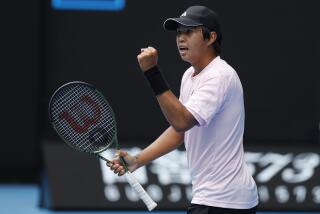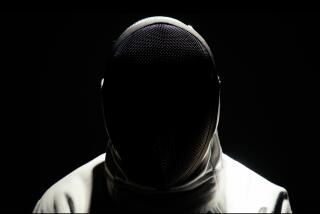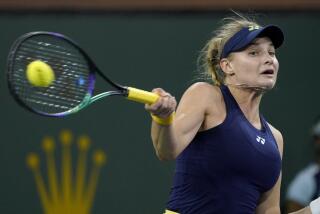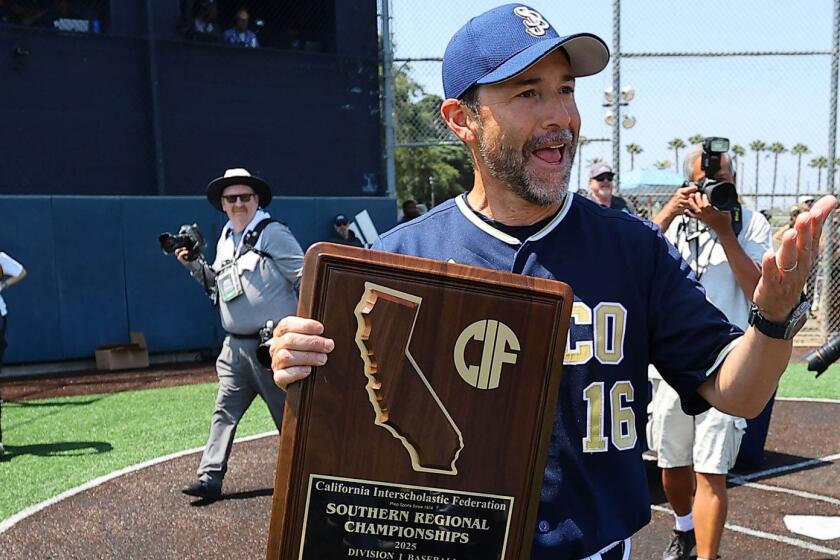Fountain Valley’s Basica Fears for Croatia From Afar : High school tennis: Teen-ager with a bit of Monica Seles’ flair is 20-1, but her thoughts are of the fighting in her homeland.
- Share via
FOUNTAIN VALLEY — Nina Basica wishes she could show her teammates on the Fountain Valley High School girls’ tennis team the white-sand beaches along the coast of her hometown of Makarska, Yugoslavia.
She wishes the friends she’s made in Orange County since her family moved in December from the southern Croatian city could swim and sun in the warm waters of the Adriatic Sea.
She wishes more of the players in the Sunset League would play the same aggressive style of tennis she learned in Yugoslavia.
She wishes the sports fans of Yugoslavia weren’t so enamored with soccer. “It’s kind of boring to watch,” Basica says, suggesting she’d like to see another American idea besides democracy find its way into Eastern Europe.
Those wishes, however, will have to wait.
At the top of Basica’s wish list right now is an end to the fighting in her native country. Since June 25, when the republic of Croatia declared its independence from the six-republic Yugoslavian alliance, Yugoslav federal troops and armies from the neighboring republic of Serbia have waged war against the Croats in an attempt to prevent the secession. Many of Croatia’s famous Adriatic coastline resort cities have been bombarded in a war in which more than 1,000 people have died.
Makarska hasn’t been attacked, but Basica goes home each day fearful of the news that might await.
“I’m scared,” said Basica, 15, a sophomore. “It’s so sad to see (the war) happen.
“It’s bad for everyone on both sides. My family is Croatian, but I don’t know whether independence is good or bad--I just know the war is terrible.”
In June, Basica and her family returned to Makarska, expecting to spend the summer. After only a week, however, the family came back to Fountain Valley because of the impending threat of war.
“There were lots of soldiers in the airport, which I’d never seen before, and you could see the war ships off the coast,” Basica said. “Makarska is a tourist center, but there were hardly any tourists. Everything seemed so weird.”
Despite the indications of imminent fighting, Basica wanted to stay in Yugoslavia. “I didn’t feel like I was lucky because we left,” she said. “I didn’t want to go back (to Fountain Valley) and leave all my friends and family there.”
Although the fighting is thousands of miles away, the war directly affects the Basica family. Basica’s father is a travel agent who was assigned to the United States last year to promote tourism to Yugoslavia. “Business is a little slow for my dad right now,” Basica said, managing a smile. “He’s selling trips to other places, so it’s not all bad, but no one’s going to go visit someplace where a war is going on.”
And instead of watching the MTV Top 20 Video Countdown like most teen-agers, Basica, her parents and her younger brother watch CNN and other news shows as often as possible to get updated news on the fighting. Basica also spends much of her free time writing letters to friends and relatives in Croatia. “We try to get through on the phone, but it keeps getting harder to call over there,” she said.
Playing tennis for the Barons, and talking about sports in general, helps Basica turn her thoughts from the war. As Fountain Valley’s No. 2 singles player, Basica had a 20-1 set record in Sunset League play through Thursday’s match against Edison. Basica, who is 5 feet 8 and left-handed, plays a style influenced by another tall Yugoslavian southpaw, Monica Seles.
“A lot of kids, and even some adults, are hitting two-handed forehands like Seles now, even though it’s not a good habit,” said Basica, who uses a conventional forehand. “But no, they don’t make that noise (Seles) makes.”
Fountain Valley Coach Barbara Ammann didn’t know how talented Basica was until school started in September. Other Baron players who had seen Basica practice over the summer told Ammann that Basica would help the team, but Ammann was still pleasantly surprised.
“Nina’s been a super addition to our team, on and off the court,” Ammann said. “She really doesn’t have any weaknesses in her strokes, and her mental approach to the game is a real asset.
“She’s had some pretty impressive wins for us when her mental toughness made the difference. She’s already established herself as one of the top players in our league.”
Ammann is also impressed with Basica’s intelligence and how quickly she’s blended into life in Fountain Valley. “She’s just a great girl, the kind you could put in any situation and she’d come out ahead,” Ammann said.
Basica began learning English five years ago, and has few problems with the language. Slang expressions made things difficult at first, and she initially wondered why so many Fountain Valley students called each other “dude.” But as she approaches the end of her first year in the United States, she says she’s comfortable with Orange County life. “Except the weather--it was so cold this summer,” she said. “In Makarska, it’s really hot in the summer, the water’s warm and I like the beaches better.”
Basica says one difference between Yugoslavian and American youth sports is the lack of low-cost advanced coaching at the public level, before high school, in the United States. “It seems like all the good players here have had private lessons that cost a lot of money,” Basica said. “In Yugoslavia, the tennis clubs and the basketball and soccer clubs keep coaching you almost for free for as long as you play.”
An advantage in the United States, however, is the existence of high school sports. Yugoslavian students don’t have the opportunity to compete in interscholastic athletics, and Basica says she appreciates the opportunity to represent Fountain Valley on the tennis court.
At her home in Fountain Valley, Basica has a picture of her father standing with Vlade Divac, the Laker center from Yugoslavia. The photo is symbolic--Basica’s father is Croatian, Divac is a Serb--and also reflects Basica’s most important wish: that in the future, Croats and Serbs can still be photographed, smiling, together.
More to Read
Get our high school sports newsletter
Prep Rally is devoted to the SoCal high school sports experience, bringing you scores, stories and a behind-the-scenes look at what makes prep sports so popular.
You may occasionally receive promotional content from the Los Angeles Times.






